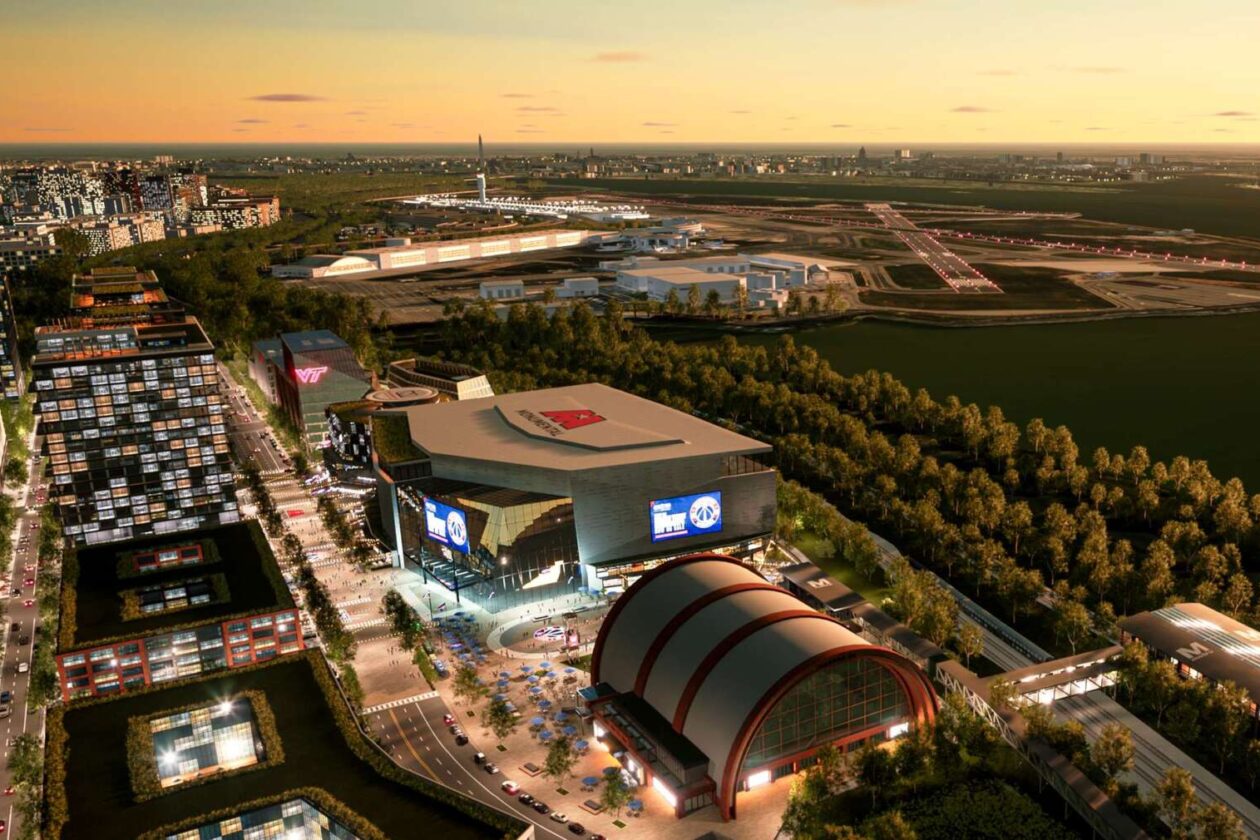
The deal to bring the Washington Capitals and Wizards to Alexandria’s Potomac Yard is officially dead, and the developer says suggestions that an arena could be built in Tysons instead were the final nail in the coffin.
Alexandria City officials revealed yesterday (Wednesday) that they had ended negotiations with developer JBG Smith, Wizards and Capitals owner Monumental Sports & Entertainment, and other stakeholders for a stadium in the proposed Potomac Yard Entertainment District. About an hour later, Monumental owner Ted Leonsis and D.C. Mayor Muriel Bowser announced that the two professional sports teams will stay at Capital One Arena in Chinatown after all.
After joining Leonsis and city leaders in December to tout the Wizards and Capitals’ planned move across the Potomac River, Virginia Gov. Glenn Youngkin lamented that “personal and political agendas” at the state level torpedoed a significant economic opportunity, while the city expressed disappointment in how discussions between Youngkin and the General Assembly unfolded.
However, JBG Smith CEO Matt Kelly pointed to a different culprit, claiming that “special interests” seeking to combine a sports arena with a casino in Tysons had “complicated and ultimately blocked” the Potomac Yard negotiations.
Despite our best efforts, this project was unable to get a fair hearing on its merits with the Virginia Senate. It is now clear that our efforts may have been complicated and ultimately blocked, in part, by special interests seeking to move the Monumental arena to Tysons Corner and to combine it with a casino. The Washington Post and other outlets have reported on this scheme and the hundreds of thousands of dollars, enormous sums in Virginia politics, of political contributions associated with it — a large portion of which were directed to key senate leaders. When one follows the money, the implications are deeply troubling for Virginia and for the future of transparency in economic development pursuits, especially those that seek certainty through the now damaged MEI legislative process.
The Washington Post reported on Sunday (March 24) that Senate Majority Leader Scott Surovell (D-34), hopeful Fairfax County casino developer Comstock CEO Christopher Clemente and political consultant Ben Tribbett, who counts both Surovell and Comstock as clients, had raised the idea of moving the Wizards and Capitals to Tysons instead of Alexandria with Monumental executives.
According to the Post, Leonsis and the other Monumental executives quickly rejected the proposal, which also didn’t appeal to Youngkin.
State Sen. Dave Marsden (D-37), who patroned the ultimately postponed bill to make Fairfax County — specifically a site in Tysons along Metro’s Silver Line — eligible for a casino, says he was never involved in “any serious talk” about combining the casino with a Monumental arena. The idea was “casually talked about” during the General Assembly’s session, which ended on March 9, but he never viewed it as a legitimate possibility.
“I think that was a last-minute thing people threw out there,” he told FFXnow. Read More

State lawmakers punted consideration of a casino in Fairfax County to next year, but that hasn’t stopped some proponents from seeking to assist in the divisive plan to bring the Washington Wizards and Capitals to Northern Virginia, whose odds of a comeback win are looking slim.
Senate Majority Leader Scott Surovell, who represents Fairfax County’s Richmond Highway corridor, recently pitched the idea of bringing both a casino and the sports arena to Tysons to a representative of Monumental Sports & Entertainment, which owns the basketball and hockey teams, the Washington Post reported on Sunday (March 24).
According to the Post, Surovell dropped the idea after Monumental President of External Affairs Monica Dixon “immediately” rejected it, but Christopher Clemente, CEO of the aspiring casino developer Comstock, and Ben Tribbett, a prominent consultant whose clients include Comstock and Surovell, “continued shopping the idea last week.”
The suggestion of combined arena/casino site in Tysons emerged as Monumental’s much-hyped plan to move the teams from D.C. to Alexandria’s Potomac Yard flailed for support. The Virginia General Assembly adjourned on March 9 without including funding for a state authority to finance the $2 billion entertainment district in their budget proposal, and at least one Alexandria City elected official withdrew her endorsement of the project.
Clemente told the Post that a joint development could “enhance financing options for the arena” by using tax revenue generated by the casino to guarantee bonds that would pay for the stadium, but Potomac Yard developer JBG Smith’s CEO, Matt Kelly, noted the deal could be used to evade Virginia’s requirement that casinos get approved by voter referendum.
Like the arena, Fairfax County’s potential casino is envisioned as part of an entertainment district, according to State Sen. Dave Marsden, who sponsored legislation to make the county eligible for a gambling establishment this past session and in 2023.
After vocal opposition from local residents and some officials, though the county board stopped short of taking an official position, a Senate committee voted on Feb. 6 to continue this year’s bill to 2025 to allow for more study and public engagement.
The combined facility proposal appears to be dead on arrival, with Monumental owner Ted Leonsis and Virginia Gov. Glenn Youngkin reportedly expressing “disgust” and “no interest,” respectively. But hypothetically, would you support the Wizards and Capitals calling Fairfax County home? Would it alter your stance on a casino?
Rendering courtesy JBG Smith
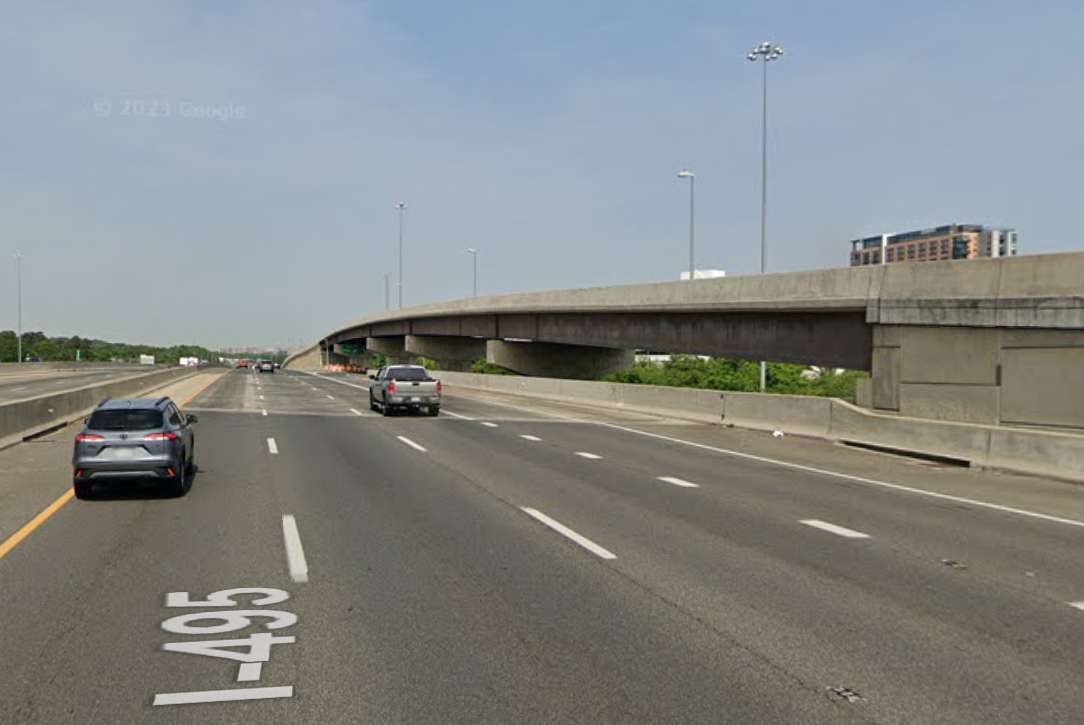
(Updated at 12:50 p.m. on 3/12/2024) Fairfax County was the site of three different fatal pedestrian crashes yesterday (Sunday), two of them occurring just minutes apart in the same proximity on the Capital Beltway (I-495).
According to the Virginia State Police, troopers responded first at 3:39 a.m. to a crash on the westbound I-495 shoulder, east of the exit to Telegraph Road at the Alexandria border.
“At this stage of the investigation, it appears an individual was on the shoulder changing a tire on a vehicle when the individual was struck by a truck,” the VSP said.
The person changing their tire died at the scene, while the truck driver was taken to a hospital for treatment. Charges in the crash “are pending,” police said in an update just before 10 a.m. on Sunday.
Then, at 3:53 a.m., police came across a woman lying in the eastbound lanes of I-495 near the Telegraph Road exit. Calls to police indicated that the woman got hit by two vehicles, according to scanner traffic on OpenMHz.
“A 2005 Honda Accord, heading eastbound in the right center lane on I-495, was unable to avoid striking a female pedestrian who had stepped into traffic,” the VSP said in an update on Tuesday (March 12). “The Accord was then struck by a 2021 Acura RDX, and the Accord then struck the jersey wall. A 2023 Nissan Rogue then struck the RDX.”
The woman, Vanessa Schwartz, 35, of Alexandria, died at the scene of the crash, which remains under investigation. A spokesperson emphasized that the two crashes “are not related.”
Police seek driver in fatal hit-and-run
Separately, Fairfax County police detectives are investigating a fatal pedestrian crash in Mount Vernon that allegedly involved the driver of a stolen vehicle.
Around 12:17 a.m., officers spotted a black 2015 Hyundai Sonata on Buckman Road near Russell Road that had been reported stolen overnight on Saturday (March 9) from the 7900 block of Sausalito Place, according to the Fairfax County Police Department.
“The driver of a stolen Sonata sped away at the sight of the police. Officers did not pursue,” the FCPD said.
An officer saw the sedan “traveling at a high rate of speed” north on Janna Lee Avenue about 15 minutes later.
“The driver sideswiped an occupied vehicle near Tamarind Street,” police said. “Officers followed the direction the driver was traveling and located the stolen vehicle crashed into a dumpster and unoccupied.”
A man later identified as James Johnson, 63, of Hybla Valley was found in the grass nearby after he had apparently been hit by a vehicle. He was taken to a hospital, where he died.
According to the FCPD, its Crash Reconstruction Unit detectives believe the driver of the stolen Hyundai hit Johnson while he was walking on Janna Lee Avenue before crashing into the dumpster. The driver wasn’t located, and the police department doesn’t have a description “at this time.”
The crash remains under investigation.
There have now been five pedestrian deaths in Fairfax County this year, including two fatal crashes on Richmond Highway in February.
Image via Google Maps

Hopes that Gov. Glenn Youngkin might sign a bill legalizing retail sales of marijuana in Virginia faded fast this week as Democrats blocked one of the governor’s top priorities: the plan to bring a professional sports arena to Northern Virginia.
As recently as Wednesday, according to multiple Capitol sources, the cannabis bill was being raised in closed-door budget talks with the governor as one of several Democratic priorities that could conceivably have been part of a package deal with the arena.
But the prospects of a grand policy bargain appeared to collapse Thursday as Democrats revealed a budget proposal without Youngkin’s arena plan, prompting the governor to say he was less inclined to look favorably on Democratic priorities. In a news conference (link added by FFXnow) on the Capitol steps, Youngkin said the arena deal Senate Democrats rejected involved up to 30,000 jobs and $12 billion in economic impact.
“And, bluntly, you want to talk about putting a cannabis shop on every corner?” Youngkin said. “I don’t quite get it.”
The governor said several other topics had been part of an “overall discussion” with Democrats. However, he suggested the rejection of an economic development project that could’ve drawn bipartisan support isn’t going to make him more likely to approve bills that passed mostly along party lines.
“I think this really sets us meaningfully back,” Youngkin said.
Del. Paul Krizek, D-Alexandria, a key sponsor of the marijuana proposal, said hopes for the bill were not high.
“As those great philosophers Tommy Chong and Cheech Marin would say, ‘It’s up in smoke,’” Krizek said.
Senate Majority Leader Scott Surovell, D-Fairfax, pointed to Youngkin’s comments on cannabis as evidence that it’s the governor who’s refusing to budge on issues that have popular support.
“He just basically flat out said one of our biggest priorities he’s not willing to consider,” Surovell said. “This governor wants to set the terms of every single negotiation as if he’s the sole arbiter of what’s reasonable in a bipartisan environment. That’s just not how it works. … If he wants something, he’s got to give us something.”
Youngkin can’t veto the marijuana bill immediately, because it technically hasn’t been sent to him yet. After this week’s developments, it may only be a matter of time. Youngkin said again Thursday that he doesn’t have “any interest” in greenlighting a retail marijuana market during his four-year term.
He has just under two years remaining, and if Democrats retake the Executive Mansion in 2025, the bill sent to Youngkin this year could potentially be the starting point for future legislative efforts. Read More
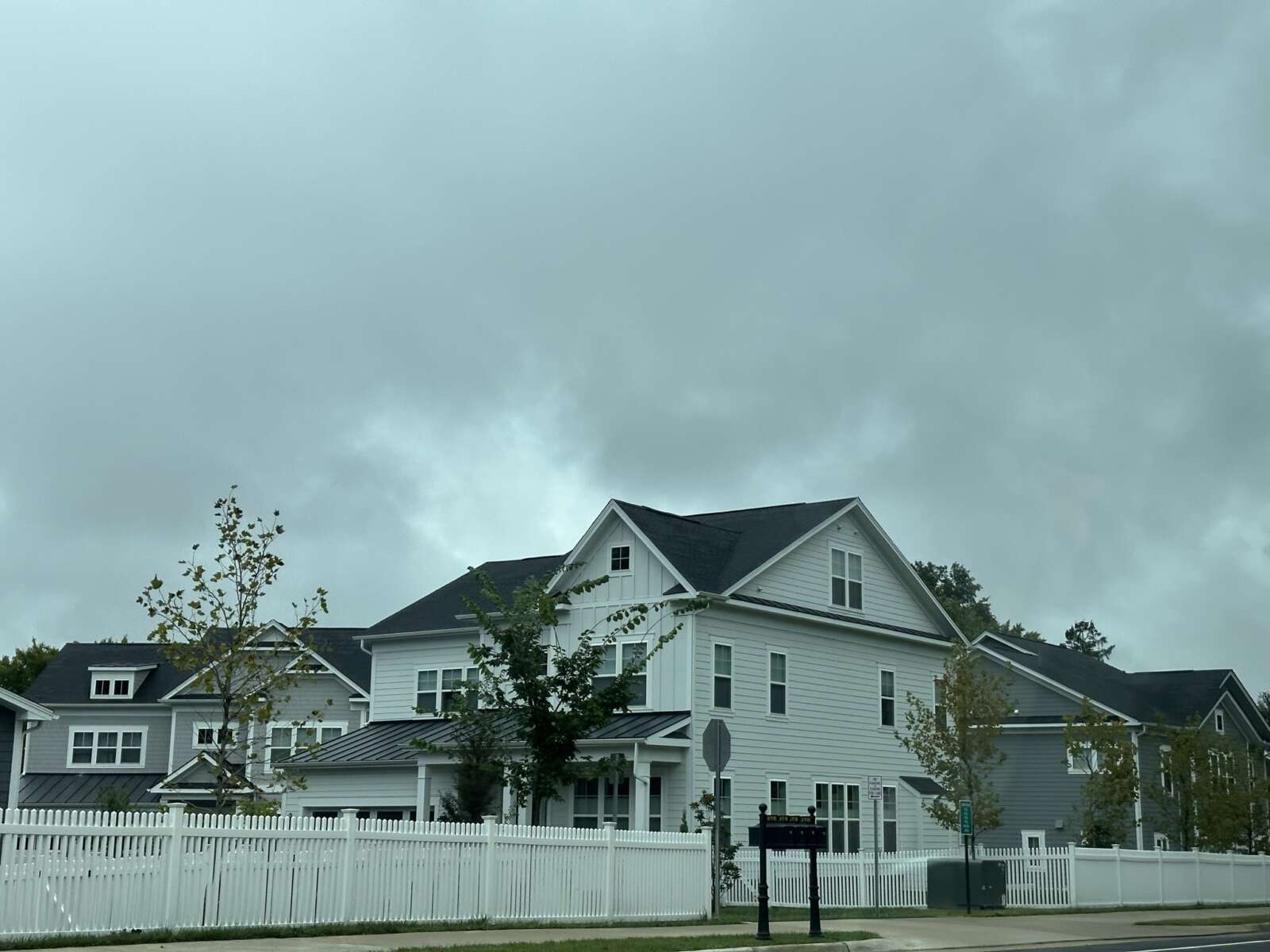
In their quest to boost the region’s limited housing supply, Northern Virginia leaders have explored a variety of potential solutions.
Arlington and Alexandria in particular garnered plenty of headlines — and legal scrutiny, in the county’s case — when officials voted separately last year to allow more dense housing in areas previously reserved for single-family detached homes, among other zoning reforms.
Fairfax County, however, has no plans at the moment to follow in its neighbors’ footsteps by eliminating single-family-only zoning, according to Board of Supervisors Chairman Jeff McKay.
Instead, the county hopes to increase and diversify its housing stock with more targeted policies, such as looser rules for accessory living units (ALUs) and workforce housing requirements, that can accommodate the different character and needs of different neighborhoods.
“Every county and city is different, and so, I’m not in a position to critique what Arlington and Alexandria have done,” McKay told FFXnow. “But we’ve been careful in Fairfax County to make sure that we can grow our affordable housing base and, at the same time, protect the integrity of our single-family neighborhoods…They’re in a different place [in their development schedule], and so, they have reached the point where they believe the only way they can address the ‘Missing Middle’ is to eliminate single-family [only] development. We are nowhere close to that point in Fairfax County.”
Size matters
The D.C. metropolitan area ranks 10th in the U.S. for “pent-up housing demand” due to a lack of supply and elevated mortgage rates, according to the National Association of Realtors. The tight supply fuels high prices that are expected to keep rising in 2024, peaking in June at a median of $935,930 for a single-family house, per a Northern Virginia Association of Realtors and George Mason University forecast.
Faced with limited space for new development, proponents of Arlington’s “Missing Middle” zoning changes and Alexandria’s “Zoning for Housing” initiative argued that opening up single-family-exclusive lots to different types of housing, such as duplexes and townhouses, will allow more units to be built, easing market pressures that have sent median single-family sales prices soaring over $1 million in both localities.
Though those measures didn’t exactly pass with ease, eliminating single-family-only zones in a place of Fairfax County’s size would be “a little bit more challenging,” says Jill Norcross, executive director of the nonprofit advocacy group Northern Virginia Affordable Housing Alliance (NVAHA).
“There’s just a lot more people, a lot more housing units and communities,” she said.
Of the 426,412 housing units in the county as of 2022, 46.1% are single-family detached houses, while 29.6% are multi-family residences and 24.2% are single-family detached homes, per the county’s most recent demographic report. In comparison, Arlington and Alexandria, respectively, are about 70 to 75% multi-family housing.
Parts of Fairfax County are dominated by single-family houses, which range from the mansions of McLean and Great Falls — the kind that Arlington leaders have said they’re trying to avoid — to older, smaller ranch-style or split-level homes like those found in Annandale or Groveton. Then, there are areas like Reston, where more than 80% of homes are townhouses, apartments or condominiums, according to Hunter Mill District Supervisor Walter Alcorn.
That variety means “a one-size-fits-all answer here is no good,” McKay says. Read More
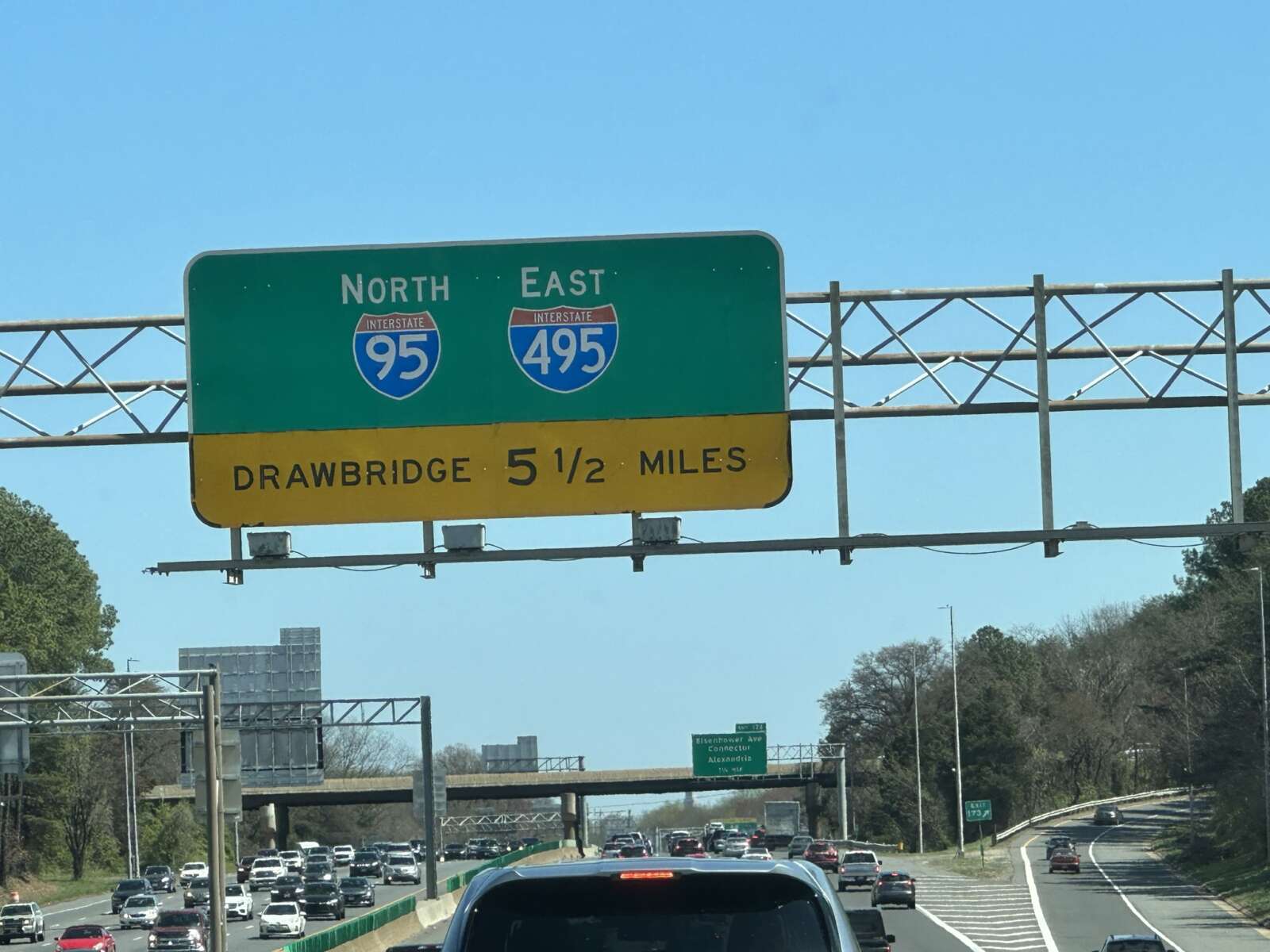
Any extension of the I-495 Express Lanes along the south side of the Capital Beltway should support additional transit options, Fairfax County leaders stressed in a recent letter to the Virginia Department of Transportation.
VDOT is currently studying options for completing the I-495 toll lanes by expanding them from the I-395/I-95 interchange in Springfield to Maryland Route 210 in Prince George’s County, an approximately 11-mile span that crosses the Woodrow Wilson Bridge in Alexandria.
At a meeting on Nov. 21, the Fairfax County Board of Supervisors approved a letter to Virginia Secretary of Transportation Sheppard Miller emphasizing the importance of accommodating transit in the project, which is intended to relieve congestion on what VDOT has said is the most heavily traveled segment of the Beltway.
“The County is appreciative that the Commonwealth is assessing solutions on the only interstate segment in Fairfax that does not have a transit benefit at this time,” the board’s letter said. “It is critical that additional travel choices are available in the Capital Beltway Corridor to move the most people as efficiently as possible in this region.”
VDOT staff presented several preliminary concepts at a public meeting on Sept. 12, including the addition of one or two general-purpose or express lanes in each direction or two reversible express lanes that would change direction with rush-hour traffic.
Staff said it has also explored adding a dedicated transit lane for buses and making adjustments that wouldn’t require new construction, such as supporting new bus routes or allowing the existing I-495 shoulders to be used as travel lanes during peak traffic periods. However, the congestion relief benefits would be limited without more space on the highway, according to the study team.
Taking a slightly more open stance than officials in Alexandria City, the Board of Supervisors didn’t comment on specific concepts, but it urged VDOT not to pursue any option that would rule out the possibility of future rail service over the Woodrow Wilson Bridge.
Opened to traffic in May 2008, the bridge was designed with a median to accommodate future transit, not with the expectation of toll lanes, Board of Supervisors Chairman Jeff McKay noted at the Nov. 21 meeting.
“From an equity standpoint, I do appreciate the fact that this is on the table, because this remains the only piece of interstate highway in Fairfax County that currently has no transit benefit whatsoever,” McKay said. “I acknowledge a failure of past efforts when projects were done to literally cut off this part of the county from the same types of transportation options that other parts of the county now have, including the communities that are sandwiched between the Springfield interchange project and the Woodrow Wilson project.”
According to the board’s letter, Fairfax County staff would support “an interim phase” without rail while Metro continues exploring how to increase capacity on its Blue, Orange and Silver lines, a study that has been underway since 2019 and could conclude by the end of this year. Read More

Things were looking up for Richard Romero, founder of Seichou Karate in Alexandria. The Old Town dojo is facing imminent closure thanks to redevelopment, but Romero finally found a new home just northeast of Springfield.
But, like a crane kick at the end of a karate championship, Romero said some surprising zoning issues have cropped up that could spell trouble for plans to open Seichou Karate at 5710 General Washington Drive.
“We found a place on General Washington Drive in Fairfax,” Romero said. “It’s in a warehouse-type structure. The space is just off I-395. It’ll be a good new home for us but we’ve encountered some difficulties.”
After 18 years in Old Town, Romero struggled to find a new space to fit the needs of the dojo. Romero said larger businesses like Amazon have been buying up warehouses and flex space in the area and, after 18 months of searching, he found a suitable location in Springfield.
Romero admitted he was so excited by the new location and worried he’d lose it that he didn’t do a feasibility study.
“I didn’t do a feasibility study and that was a mistake,” Romero said. “I had no idea we would run into so many bureaucratic complications.”
The main issue, Romero said, has been parking. Romero said the school will have 20 students and two staff and Fairfax County has told him that it means he needs 22 parking spaces, which is unlikely for the shopping center-like space.
“That’s where we’re really hung up right now,” Romero said. “They say I need 22 parking spaces, 24/7. But that doesn’t reflect how our business works.”
Romero said his classes get started around 4:30/5 p.m., which is when many of the nearby light industrial and supply businesses close.
“There’s plenty of parking if you go there any time of the day,” Romero said, “but the county says this space — with maybe 20 tenants in the whole building –simply doesn’t have enough parking spaces to include all the tenants.”
A Fairfax County spokesperson said because Seichou Karate is a new use for the site, it has different parking requirements than the previous tenant.
“When a new tenant has different parking requirements than the previous tenant, it requires a more in-depth review of the application by the county,” the spokesperson said. “The previous use was an establishment for production that only required four spaces. Seichou Karate is a school of specialized instruction that requires several more parking spaces to accommodate staff and students.”
The spokesperson said in these cases, the applicant must submit a parking tabulation to demonstrate the site can accommodate the parking required for this use, which the spokesperson said Seichou Karate has not.
“I’ve tried to reason with them,” Romero said. “I’ve said ‘please, look at the parking lot during the daytime’ but they say no, the rules are the rules.”
Romero said that parking tabulation required by the County is costly, around $5,500, with a $1,000 filing fee.
“To boot, since July, I’ve been paying two landlords,” Romero said. “We’re not causing congestion and there’s plenty of space… They’re not willing to apply those rules in a way that makes sense.”
Romero said he has to be out of his current space in Alexandria by Dec. 31 and it’s looking unlikely that Seichou Karate will be open in Fairfax by that time.
“Getting that ready by December, even if it were approved now, is fanciful at best,” Romero said. “It’s really a kafkaesque nightmare.”
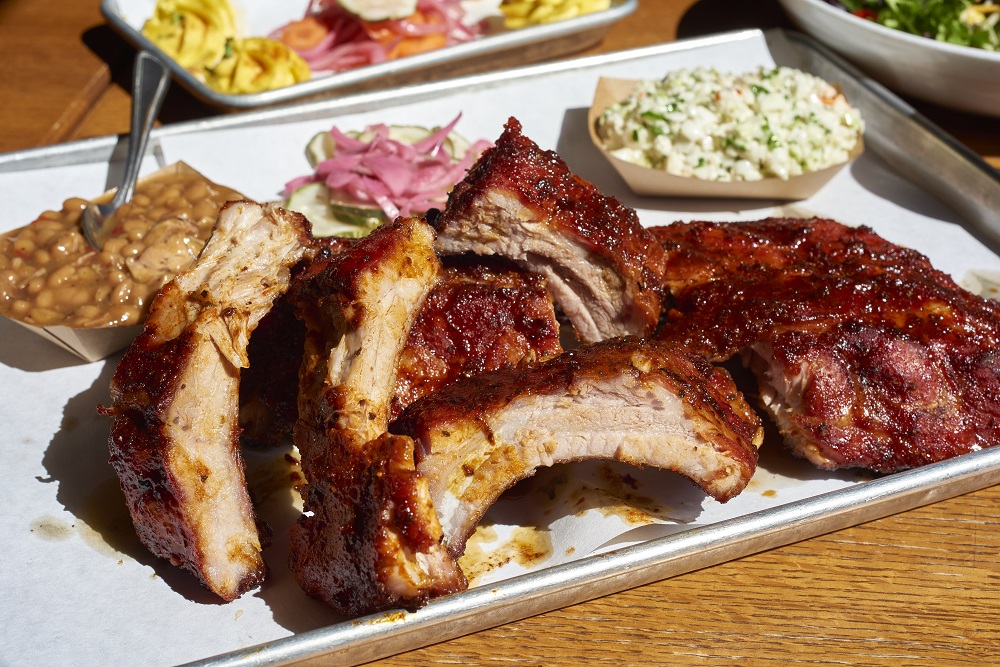
Dunn Loring diners will soon get a taste of the Southern-style smoked meats that have made Myron Mixon the self-proclaimed “winningest” man in barbecue.
Myron Mixon Pitmaster BBQ is slated to open a new restaurant at 2670 Avenir Place near the Dunn Loring Metro station this fall, its first expansion since launching in Old Town Alexandria in 2016.
“I’ve always found a special home in the DMV area because of the great community here who appreciate good barbeque,” Mixon said in a statement. “It’s very exciting to have the chance to bring even more pitmaster flavor and competition ‘que with this new restaurant in Dunn Loring, and I’m looking forward to welcoming everyone through our doors soon.”
A native of Unadilla, Georgia, where he has served as mayor since 2016, Mixon has earned acclaim on the competitive barbecue circuit with more wins than anyone else in the world, according to his official bio. His accolades have included five world championships and an induction into the Barbecue Hall of Fame in Kansas City.
He has also made TV appearances as a judge on Destination America’s “BBQ Pitmasters” and a competitor on the two-season show “BBQ Pit Wars.”
Even before opening his Alexandria restaurant, Mixon had close ties to the D.C. area as a regular competitor in the District’s annual Giant Barbecue Battle, where he and his team Jack’s Old South won 13 grand championships, according to the Washington Post.
Eric Cohen, a partner on Myron Mixon Pitmaster BBQ, says the business loves “being a part of the Old Town community” and has been eager to expand elsewhere in Northern Virginia “for a while.” When District Barbecue closed earlier this year, they decided it was time to make a move.
“We thought the opportunity was the perfect fit for the brand,” Cohen told FFXnow.
The Dunn Loring restaurant will take a fast-casual approach with counter service, and the bar will be more limited than the one in Alexandria, serving just beer and wine.
However, the food menu — which is still being finalized — is expected to be “very similar” to what’s on offer in Alexandria, a public relations representative said. Offerings include plate and a la carte smoked meats, sandwiches, salads, baby back ribs, chicken wings, and sides like mac and cheese and peach BBQ baked beans.
Cohen credits Mixon’s involvement with distinguishing the business from the “plethora of [other] delicious barbeque options” in the D.C. region.
“He’s incredibly hands on with our menu and team to ensure we serve our guests the best ‘que, worthy of a pitmaster,” Cohen said. “As the winningest man in competition barbeque, Myron is a trusted authority in the barbeque world, and his food reflects the high standards that he sets for each item that leaves the grill.”
An official opening date hasn’t been set, but Cohen says that and details of anticipated grand opening celebrations will be shared “soon.”
The Shops at Avenir Place has recently started to fill vacancies that opened up during the pandemic. The retail center welcomed the tattoo and piercing shop Wicked Goddess this past spring, and the taiyaki pop-up Rice Culture hopes to start serving the Japanese treats out of its first brick-and-mortar store in October.
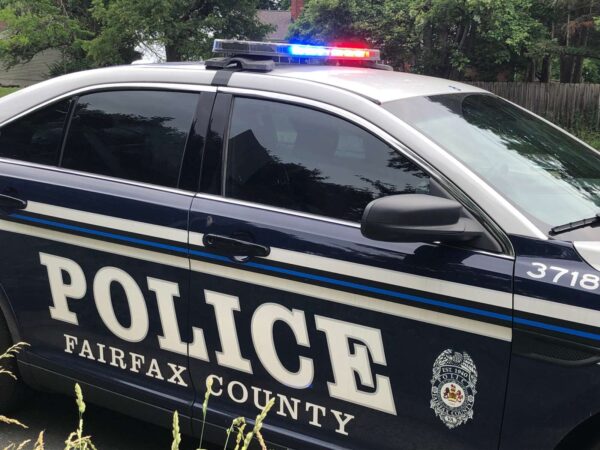
(Updated at 4:10 p.m.) The long-fought activism of one local resident has culminated in the Fairfax County Police Department changing its approach to publicly identifying where crimes occur.
Arlington-based blogger Dave Statter announced on Wednesday, July 12 that Police Chief Kevin Davis has committed to having FCPD public information officers and social media channels use community names, rather than postal addresses, in public safety announcements, clearing up decades of confusion.
A crash in the Fort Belvoir area, for instance, will no longer be described as happening in Alexandria, when the city’s limits are almost 10 miles away.
(1) NEW: My battle of 40 years is over. 2 weeks ago @ChiefKDavis committed to having @FairfaxCountyPD stop using phrases like "Alexandria/Falls Church section of Fairfax County". Instead, they'll use community names within the county. As you can see it has already begun. (more) pic.twitter.com/wCy4tTeTHP
— Dave Statter (@STATter911) July 12, 2023
Known for his coverage of fire, EMS and police issues on Twitter and his blog, Statter argues that relying on postal addresses when informing the public of crime and safety incidents leads news outlets to share “imprecise” reports that associate murders or robberies in the wrong jurisdiction.
He says this issue is most relevant in Falls Church and Alexandria, two independent cities that share often unclear boundaries with Fairfax County.
The frequent conflation of the two cities with Fairfax County stems from the U.S. Postal Service providing a large swath of Fairfax County residents with Falls Church and Alexandria addresses, Statter claims. These addresses are provided to news outlets by PIOs when pinpointing the location of a crime, giving “people the impression that more crime was occurring in Alexandria [and Falls Church] than what was actually occurring,” Statter told FFXnow.
“The postal service created these artificial boundaries that don’t align with the real political boundaries that are on the map,” Statter said. “And you will often find a national story that says something that occurred in a town somewhere, but it really didn’t occur in that town — it was outside that town in a different jurisdiction. So it’s a problem that people have ignored for many years. I’m trying not to let them ignore it.”
The “general confusion” around city and county limits has also left many residents scratching their heads over where they really live and generated constant citizen inquiries to local governing bodies, Falls Church Communication Director Susan Finarelli says.
“People try to pay taxes to the city of Falls Church when, in fact, they live in Fairfax County,” Finarelli said. “…It is something that City of Falls Church government employees deal with all the time. I even copy and paste a statement of, ‘Oh, thank you so much for your email. Your address is actually in the Fairfax County part of Falls Church. Here’s how you can contact Fairfax County for that service.'”
To remedy this issue, which he says is not only endemic to Northern Virginia but the entire country, Statter has spent 41 long years advocating for PIOs and news outlets to instead use community and neighborhood names, such as Bailey’s Crossroads or Mount Vernon. Read More
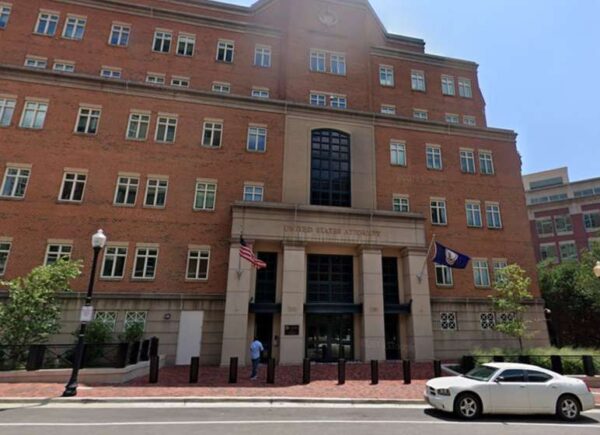
An Alexandria man was sentenced to 15 years in prison on Wednesday (May 10) for selling fentanyl to a woman who died from an overdose in Clifton in 2021.
Reza Hashemi, 34, was sentenced for conspiring to distribute over 400 grams of fentanyl in Northern Virginia between July 2020 and June 2021, the U.S. Attorney’s Office said in a news release announcing the judgment by U.S. District Judge Leonie M. Brinkema.
According to court documents, Fairfax County police were called to a home in the Clifton area on May 28, 2021 by a witness who told 911 that a woman had taken an “unknown white substance” and needed naloxone, the drug that can reverse opioid overdoses.
A woman identified as J.F. was found unresponsive in the residence’s basement and pronounced deceased at 11:44 p.m. after failed resusitation efforts, one of the responding police officers said in an affidavit.
The witness told police that they had obtained powder fentanyl from Hashemi at a spot near Reed Avenue in Alexandria City.
Police arrested Hashemi in Tysons on June 2, 2021 after he dropped off fentanyl that the witness had arranged to buy from him, according to the affidavit.
Court records indicate that Hashemi reached a plea agreement with prosecutors in February.
“Mr. Hashemi became addicted to opioids after suffering trauma early in his life. He accepted responsibility early on in this case and continues to do so,” the Office of the Federal Public Defender in Alexandria, which represented Hashemi, said in a statement. “Although we do not agree that the sentence imposed was necessary, Mr. Hashemi accepts the court’s decision and is determined to address his own addiction through the next 15 years and beyond.”
In announcing the sentencing, the U.S. Attorney’s Office also linked Hashemi to the Oct. 24, 2020, fatal overdose of a 22-year-old man identified as J.V. in Vienna.
Hashemi distributed drugs, including “pressed counterfeit pills containing fentanyl,” to J.V. from Sept. 18, 2020 to “at least” Oct. 14, 2020, according to a statement of facts filed by prosecutors. After police informed him of J.V.’s death, Hashemi said he didn’t want to talk to law enforcement without a lawyer.
Court documents don’t explain how police determined that the drugs involved in J.V.’s overdose were the ones he got from Hashemi. The U.S. Attorney’s Office didn’t respond to FFXnow’s request for comment by press time.
“The government’s repeated insinuations in connection with [Hashemi’s] invocation of his right to counsel misrepresent the facts and betray an ignorance of every individual’s constitutional rights,” the public defender’s office said.
Photo via Google Maps

